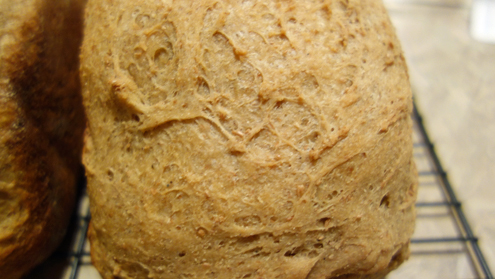November 12, 2016 - 1:48pm

Low Carb Bread in a B&D B600C

we have used the same basic recipe for years with the old B&D B2300. changes in the Vital Wheat gluten and oat flour meant minor changes like more yeast needed.
the new machine made a fine loaf the first time but the second - on 2 machines made lumpy and 'stringy' looking tiny loaves.
Any ideas?
thanks


http://www.4shared.com/photo/gapHqTEGce/loaf2.html
the lumpy view
Put the ingredients in your bread machine in the order given, and run the machine. Remove the
loaf from the machine and bread case promptly to cool.
Yield: About 10 slices, each with 13 grams of carbohydrates and 7.5 grams of fiber, for a total of
5.5 grams of usable carbs and 19 grams of protein.
2 Pound Loaf
3/4 cup warm water
3/4 cup heavy cream
2 tablespoons soft butter/canola
2 eggs
1/2 teaspoon salt
1 1/2 cups vital wheat gluten
4 tablespoons wheat germ
4 tablespoons wheat bran
1/2 cup psyllium powder
1 cup oat flour
1 cup vanilla whey protein powder
2 packets stevia
3 1/2 teaspoons regular yeast
http://www.4shared.com/photo/ixmKNapwba/loaf3.html
this is the same ingredients made in the old machine. not as high as usual and a little stringy.
thanks
I really don't know but it looks like the dough was very stiff. I know nothing about low carb bread so take my advice with a huge grain of salt.
Thanks
Hopefully more kind people will make suggestions
I haven't used a machine for years but what I do remember is that different selections (regular,whole wheat,etc) will cause different timing for the mix,raise,bake cycles. Also a new machine-even from the same company- may have totally different timings from your old model.
To me, your loaf looks like it rose and then started to fall as it baked or possibly fell as it cooled. To me, it looks like it is overproofed. That would suggest that the final raise cycle is too long (a machine setting over which you probably have no control) or it is proofing to quickly (which may be able to adjust with how much yeast you add).
So my suggestion to immediately affect the next loaf is that you should try to decrease the yeast a bit. However, I still suggest you study the appliance book from the old and new machines and compare the timing of the cycles. Perhaps there are settings you can adjust.
I concur that this looks like it would be a dry and heavy dough, just by the ingredients. Very hard for a machine to mix/knead without burning out. Have you ever tried increasing the liquid?
Does this loaf crumble after the first 24 hours? It would seem to me that the high fiber ingredients would benefit from being able to soak up moisture for a while before being mixed in so it doesn't rob the moisture from the bread after it is baked-causing it to crumble. It would necessitate more water in the recipe and mixing outside the machine.
Have you tried cooling it in the pan on it's side or even upside down (like an angel cake). This allows the fibers to harden before needing to support the whole loaf structure. Cool this way just until it is lukewarm, then de-pan. Might help.
Good luck.
It seems like a "Non Sequitur" too me. You might try looking for recipes or advice on a "Low carbohydrate forum" like this one .........
http://lowcarbfriends.com/
The Fresh Loaf is a wonderfully unique site that has allowed the members to explore and appreciate the natural variety of making bread across continents and cultures and ingredients. It is a "how to" forum for anyone making any kind of bread-no matter the ingredients or what the definition of "bread". There are many of the same technical issues in the process. It really opens our eyes to how our differences are just that-different- and not better or worse.
Several years ago, members asked for a few different forum to be added-Baking for special needs and a Bread Machine forum for members needing advice in these areas. This post kind of falls between those.
Try a few of the suggestions and get back to the forum on your results. Sometimes you need the forum but sometimes the forum needs you! I'd like to know how it turns out. I have baked Gluten free but never low carb. They seem similar.
I don't know much about low carb bread but how about incorporating herbs and spices that help the body process sugars. I imagine avoiding carbs altogether in bread is nigh on impossible but if you can come up with a recipe that includes these herbs and spices it might help. I've just googled this and came up with the website below.
http://www.top10homeremedies.com/kitchen-ingredients/top-10-herbs-and-spices-for-diabetes.html
Thanks everyone
Adding water sure helped!
we added a little yeast to bake the loaf bigger as well.
moments later outside of the machine it sank quite a bit.
too much water or yeast?
thanks all
It still sounds over proofed. This means it over-rises. The walls of the bubbles are too weak to hold it up so they collapse and the bread sinks in the middle. Try decreasing the yeast a bit so that in the time the machine gives it to rise, it will rise slower because there is less yeast doing the work. That way it won't over rise.
Keep the water at the increased level.
Because this is a low carb, it might also be that the walls are naturally weaker. I'm not familiar with some of these ingredients and how they behave. If this is the case, you may want to try what is done for angel food cakes or pannetone (which have a very weak wall structure) and cool them upside down, hanging, until the loaf is cool. The wall becomes a bit more rigid when cool.
thanks for your advice